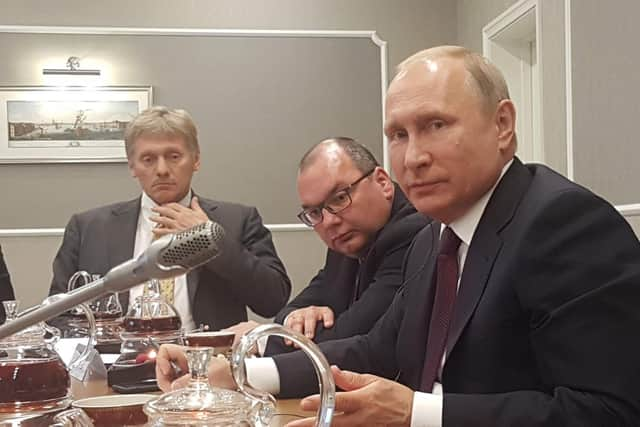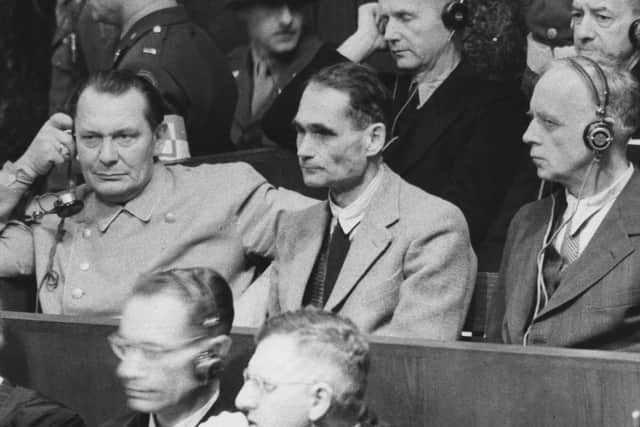Ukraine-Russia war: Vladimir Putin should fear being put on trial for war crimes – Dr Paul Behrens
Within hours of Vladimir Putin's orders, Russian troops attacked Ukraine from three sides. In the last two weeks, Kherson – last occupied in the Second World War – has fallen, Mariupol is under siege; Russian forces are shelling Kyiv and have launched airstrikes on the capital.
Just like that, Europe seems to return to an age where conquest was a bloodsport devised in gentlemen's clubs and, as in the bad old days, the creator of all that carnage seems safe enough.
Advertisement
Hide AdAdvertisement
Hide AdWhat, after all, can happen to him? Napoleon, the bane of Europe, was given the principality of Elba (with a stipend and a personal guard). And the Kaiser, after the First World War, was allowed to retire to a stately home in Doorn in the Netherlands, in defiance of utopian dreams to put him before an international tribunal.
And everything that has since been done to advance civilisation, the progress fought and worked for over four generations, seems a frightfully fragile thing.
The Russian government did everything to reinforce that impression: the invasion, one can hardly believe it, came at the very time when the situation was being discussed in the United Nations Security Council. If the man had wanted to show his disdain for the international order, he could not have sent a clearer message.
And yet. For those of us who teach international law and who, year in, year out, have to patiently explain that our subject really exists and that its rules are serious, it was heartening to see how the world suddenly rediscovered the law of nations and the meaning of solidarity in the international community.


It was quite something.
After years of indecision, Ukraine, Georgia and Moldova submitted their applications to join the European Union – all within less than 100 hours. In Finland and Sweden, a majority of people now wants to be in Nato.
European states agreed on tough sanctions against Russia, and the reaction within the UN General Assembly to the invasion was clear: 141 members demanded the unconditional withdrawal of the Russian troops (although one wonders about the 35 abstentions, and even more about the few states that did not consider the matter important enough to vote).
One thing is now certain: international law is not an obscure matter for oddballs in ivory towers. A red line had been crossed, and the international community has shown that there is such a thing as common values; and that the world is prepared to defend them.


What is more: over the last century, international law, too, has advanced and crafted instruments for its defence.
Advertisement
Hide AdAdvertisement
Hide AdThere is no shortage of parallels that are drawn between Ukraine and the days of the Second World War. But even then, legal tools to counter the numerous crimes – aggression, war crimes, crimes against humanity – were in the works.
And now as then, they had to be tested against the realities. Who would have thought, early in 1941, when the Nazis were at the height of power, that Hermann Göring would one day be put on trial, his crimes and corruption laid bare for all to see?
Who also, at the beginning of the Balkan wars of the 1990s, would have thought that the Serbian President Slobodan Milošević would end his days in a prison cell of the Yugoslavia Tribunal?
It is a glimmer of hope for the world – and a warning for the man in the Kremlin.
With regard to Ukraine, there have been suggestions of a second Nuremberg tribunal to try the perpetrators. But international law is way ahead of them. In 1998, an institution was created which deals with exactly this kind of situation – the International Criminal Court (ICC) in The Hague.
And its chief prosecutor, the British lawyer Karim Khan, has already been active in the matter. In fact, things have developed at breath-taking speed in further testament to the determination of the international community.
On February 28, Khan declared his willingness to investigate the situation, but noted that this would go faster if a state were to refer the matter to the Court. (According to the rules, if the prosecutor starts an investigation, he first has to get approval from the pre-trial chamber; if a state refers the situation, that is not required).
Two days later, 39 states had referred the situation to the ICC, including the United Kingdom and numerous other European countries.
Advertisement
Hide AdAdvertisement
Hide AdIt is early days, to be sure, and there simply is no telling how successful the court's efforts will be.
But evidence is mounting that the Ukrainian invasion has hit more obstacles than Putin envisaged, and it looks less and less likely that this will be the blitzkrieg the Kremlin may have dreamt of.
That, however, is to the advantage of international law – a law that always needs a long-term perspective to develop its full potential. The mills of international justice grind slowly, but their impact will be felt long before the first suspected perpetrators are brought to trial.
The clearer the prospect of criminal prosecution, the more likely is it that those close to Putin will wish to put clear blue water between themselves and the master of the Kremlin.
There is a chance, then. Not more than the flicker of a candle, but a chance. If the resolve of the international community remains as strong as it is now, there is a chance that, this time, the great thief of Europe will not get away with it.
Dr Paul Behrens is co-author of Elements of Genocide. He teaches international criminal law at the University of Edinburgh
A message from the Editor:
Thank you for reading this article. We're more reliant on your support than ever as the shift in consumer habits brought about by coronavirus impacts our advertisers.
If you haven't already, please consider supporting our trusted, fact-checked journalism by taking out a digital subscription.
Comments
Want to join the conversation? Please or to comment on this article.
